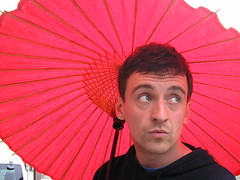The Sins of the Father
Following WWII, Korea was separated into two states after “liberation” from the occupying Japanese. Then allies, Russia & America chose to divide the territory. The encroaching Cold War led them to install governments to their liking. America engineered Democracy in the South, whilst Russia installed a Communist regime in the North, led by Kim Il-sung, father of the DPRK’s current ruler.
On the whole, Korea desired re-unification. Unfortunately, occupation and war from several powers (Russia and Japan had been at war over Korea at the turn of the century) had left conflicting interests amongst its people. Occupying forces had helped contribute to a “brain-drain”, as gifted Koreans were recruited for Government Agencies, thus seen as collaborators with the invaders. Such disunity was increased with the emergence of and conflict between Communist, Industrialist, pro US, pro Russian, pro Chinese groups, and early attempts at unity failed.
In 1950, as part of a relaxing of military commitments, US forces pulled out of South Korea. Comments later made by then Secretary of State, Dean Acheson (which have since been branded as careless) implied that South Korea wasn’t seen as a priority by Washington.
Effectively, this gave the green light to a well equipped North Korea, who wished to unify the country under a Communist Government. On the 25th of June, 1950, the DPRK launched a surprise attack on the South. The Korean War raged for three years, devastating the South. A ceasefire was drawn up, ending hostilities, however, nothing more substantial has been agreed upon. Technically, North and South Korea have still been at war since then.
The death of Stalin in 1953 came as a huge blow to the Communist World. The orthodox Communist leader Kim Il-sung rejected the de-Stalinisation that followed, thus isolating the DPRK from its’ former political friends. Kims’ focus on the policy of “Juche” (self-reliance) has cemented this isolation, and probably contributed a great deal to the current situation of poverty and famine in North Korea. In order to achieve independence from the Soviet Union, Juche focused on heavy industry. Unfortunately, this is mostly geared towards the manufacture of arms.
In the course of the DPRK’s hermeticism, a colossal personality cult has been built around Kim Il-sung and his son, Kim Jong-Il. Campaigns such as the building of monuments, opening facilities and staging political events cost an estimated $890 million, annually. Even aside from an already impoverished country meeting that absurd figure, it’s clear that the DPRK is an unstable regime, which probably explains why neighboring China has been so careful in handling any related issues. What China and South Korea fear is the regime collapsing, and themselves being flooded with refugees.
Along with the mismanagement of national funds by the Government, the North has been suffering sanctions for years. As is always the case, such measures never affect the leaders making the decisions; only the people. The action of further sanctions could go either way - make the people of North Korea resent the “rest of the world” even more, or contribute to the eventual downfall of the regime.
Defense analysts believe that whilst the DPRK may have nuclear capabilities, they are still a long way from being able to deliver a warhead by missile. The biggest problem however is with the DPRK’s secrecy. Have they really tested a nuclear weapon, or have they set off dynamite in an underground facility? This ambiguity is exactly what its’ leaders want. Military action from the UN is inconceivable, sanctions may only make the problem worse. Whatever their abilities, this small, poor and heavily armed country has the attention of the world.
Labels: anger, I wasn't expecting that, oops, ouch, politics



1 Comments:
Hmm, I have a feeling China will deal with N. Korea long before it becomes an issue for the rest of the world.
N. Korea may be heavily armed but it lives next door to the largest airforce and army in the world
Post a Comment
<< Home